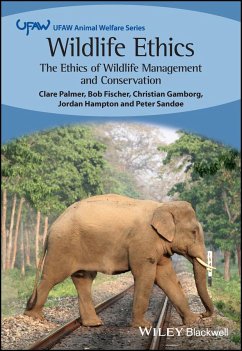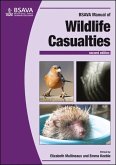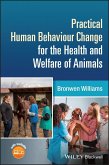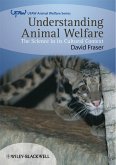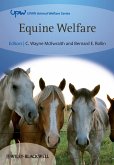Wildlife Ethics
A systematic account of the ethical issues related to wildlife management and conservation
Wildlife Ethics is the first systematic, book-length discussion of the ethics of wildlife conservation and management, and examines the key ethical questions and controversies. Tackling both theory and practice, the text is divided into two parts. The first describes key concepts, ethical theories, and management models relating to wildlife; the second puts these concepts, theories, and models to work, illustrating their significance through detailed case studies on controversies in wildlife management and conservation.
The book explores pressing topics including human responsibilities due to climate change, tradeoffs when managing zoonotic disease risks, the ethics of the wildlife trade, culling non-native species, indigenous wildlife use, and zoo-based conservation programs. Readers are encouraged to explore different ways of valuing wild animals and their practical implications.
This essential text:
_ Explains and explores relationships between valuing biodiversity, human utility, ecosystems, species, and animal welfare
_ Describes established approaches to wildlife management, such as sustainable use, and emerging concepts, such as compassionate conservation
_ Discusses key ethical theories, including utilitarianism, ecocentrism, and animal rights
_ Offers a practical model of how to analyze ethical issues in wildlife management and conservation
Wildlife Ethics: The Ethics of Wildlife Management and Conservation is an accessible introduction to complex ethical issues, making the book an important resource for students in fields such as conservation biology, ecology, environmental science and policy, game management, public health and veterinary medicine. It will also be an invaluable tool for wildlife managers, conservationists, One Health practitioners, practicing veterinarians and animal rehabilitation staff, contemporary wildlife professionals and other stakeholders.
Hinweis: Dieser Artikel kann nur an eine deutsche Lieferadresse ausgeliefert werden.
A systematic account of the ethical issues related to wildlife management and conservation
Wildlife Ethics is the first systematic, book-length discussion of the ethics of wildlife conservation and management, and examines the key ethical questions and controversies. Tackling both theory and practice, the text is divided into two parts. The first describes key concepts, ethical theories, and management models relating to wildlife; the second puts these concepts, theories, and models to work, illustrating their significance through detailed case studies on controversies in wildlife management and conservation.
The book explores pressing topics including human responsibilities due to climate change, tradeoffs when managing zoonotic disease risks, the ethics of the wildlife trade, culling non-native species, indigenous wildlife use, and zoo-based conservation programs. Readers are encouraged to explore different ways of valuing wild animals and their practical implications.
This essential text:
_ Explains and explores relationships between valuing biodiversity, human utility, ecosystems, species, and animal welfare
_ Describes established approaches to wildlife management, such as sustainable use, and emerging concepts, such as compassionate conservation
_ Discusses key ethical theories, including utilitarianism, ecocentrism, and animal rights
_ Offers a practical model of how to analyze ethical issues in wildlife management and conservation
Wildlife Ethics: The Ethics of Wildlife Management and Conservation is an accessible introduction to complex ethical issues, making the book an important resource for students in fields such as conservation biology, ecology, environmental science and policy, game management, public health and veterinary medicine. It will also be an invaluable tool for wildlife managers, conservationists, One Health practitioners, practicing veterinarians and animal rehabilitation staff, contemporary wildlife professionals and other stakeholders.
Hinweis: Dieser Artikel kann nur an eine deutsche Lieferadresse ausgeliefert werden.
"The way this book is structured - using clear headings and an explanation of ethics that reflect the nuances and complexities of the subject - makes it an excellent resource for students, vets, wildlife managers, policymakers and interested members of the public."
--Justine Shotton, BVA Past President and Head Vet for Wildlife and Exotics, RSPCA
Vet Record (April 2024)
This book can equip people with an understanding of the ethical dilemmas that different worldviews create...This book provides readers with the concepts and language to communicate and anticipate this complexity and to better navigate divergent views"
- Craig Stephen, McEachran Institute, Canada
Journal of Wildlife Diseases (2024)
"if you are directly or indirectly interested in wildlife management and conservation and the ethical issues these throw up, rather than consider why you should read this book (or at least make forays into it), I would ask, more importantly, why you wouldn't, appealing as it does to a broad readership in the emerging field of wildlife ethics? It contains so much useful consolidated and clearly worked through background material and sound ethical theory and puts these to work in very practical ways that can be broadened out to be used in numerous other situations ... it will certainly equip you to take an ethical view of potential options and open your mind to wider consequences from the basis of sound contemporary understanding."
--Pete Goddard, Chair of the UK's Wild Animal Welfare Committee, Aberdeenshire
The UFAW Journal (Vol 33/2024)
--Justine Shotton, BVA Past President and Head Vet for Wildlife and Exotics, RSPCA
Vet Record (April 2024)
This book can equip people with an understanding of the ethical dilemmas that different worldviews create...This book provides readers with the concepts and language to communicate and anticipate this complexity and to better navigate divergent views"
- Craig Stephen, McEachran Institute, Canada
Journal of Wildlife Diseases (2024)
"if you are directly or indirectly interested in wildlife management and conservation and the ethical issues these throw up, rather than consider why you should read this book (or at least make forays into it), I would ask, more importantly, why you wouldn't, appealing as it does to a broad readership in the emerging field of wildlife ethics? It contains so much useful consolidated and clearly worked through background material and sound ethical theory and puts these to work in very practical ways that can be broadened out to be used in numerous other situations ... it will certainly equip you to take an ethical view of potential options and open your mind to wider consequences from the basis of sound contemporary understanding."
--Pete Goddard, Chair of the UK's Wild Animal Welfare Committee, Aberdeenshire
The UFAW Journal (Vol 33/2024)

